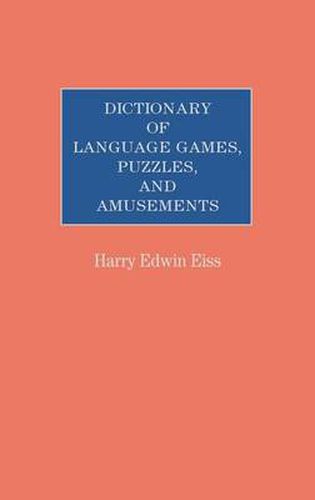Readings Newsletter
Become a Readings Member to make your shopping experience even easier.
Sign in or sign up for free!
You’re not far away from qualifying for FREE standard shipping within Australia
You’ve qualified for FREE standard shipping within Australia
The cart is loading…






Throughout recorded history, mankind has turned to language play as a source of entertainment and intellectual stimulation. This unique new reference provides comprehensive listings and explainations, together with samples and historical information, concerning the hundreds of letter and word games, puzzles, and linguistic entertainments that enrich our cultural life.
In an introductory section, the author discusses the various ways of manipulating words and letters and the relation of this pastime to literature, linguistics, education and humor. He comments on the use of word-play techniques in the teaching of language arts, noting their demonstrated benefits in stimulating creativity and motivating the unwilling student. Turning to the literary uses of language play, he talks about writers–from Shakespeare, Dickens, James Joyce, and Gertrude Stein to the dadaists, Edward Lear, Ogden Nash, and various contemporary literary artists–whose linguistic devices run the gamut from riddles, acrostics, cross-word puzzles, and anagrams–are considered, along with individual and group games intended to entertain, teach skills, or challenge the imagination or intellect.
$9.00 standard shipping within Australia
FREE standard shipping within Australia for orders over $100.00
Express & International shipping calculated at checkout
Throughout recorded history, mankind has turned to language play as a source of entertainment and intellectual stimulation. This unique new reference provides comprehensive listings and explainations, together with samples and historical information, concerning the hundreds of letter and word games, puzzles, and linguistic entertainments that enrich our cultural life.
In an introductory section, the author discusses the various ways of manipulating words and letters and the relation of this pastime to literature, linguistics, education and humor. He comments on the use of word-play techniques in the teaching of language arts, noting their demonstrated benefits in stimulating creativity and motivating the unwilling student. Turning to the literary uses of language play, he talks about writers–from Shakespeare, Dickens, James Joyce, and Gertrude Stein to the dadaists, Edward Lear, Ogden Nash, and various contemporary literary artists–whose linguistic devices run the gamut from riddles, acrostics, cross-word puzzles, and anagrams–are considered, along with individual and group games intended to entertain, teach skills, or challenge the imagination or intellect.